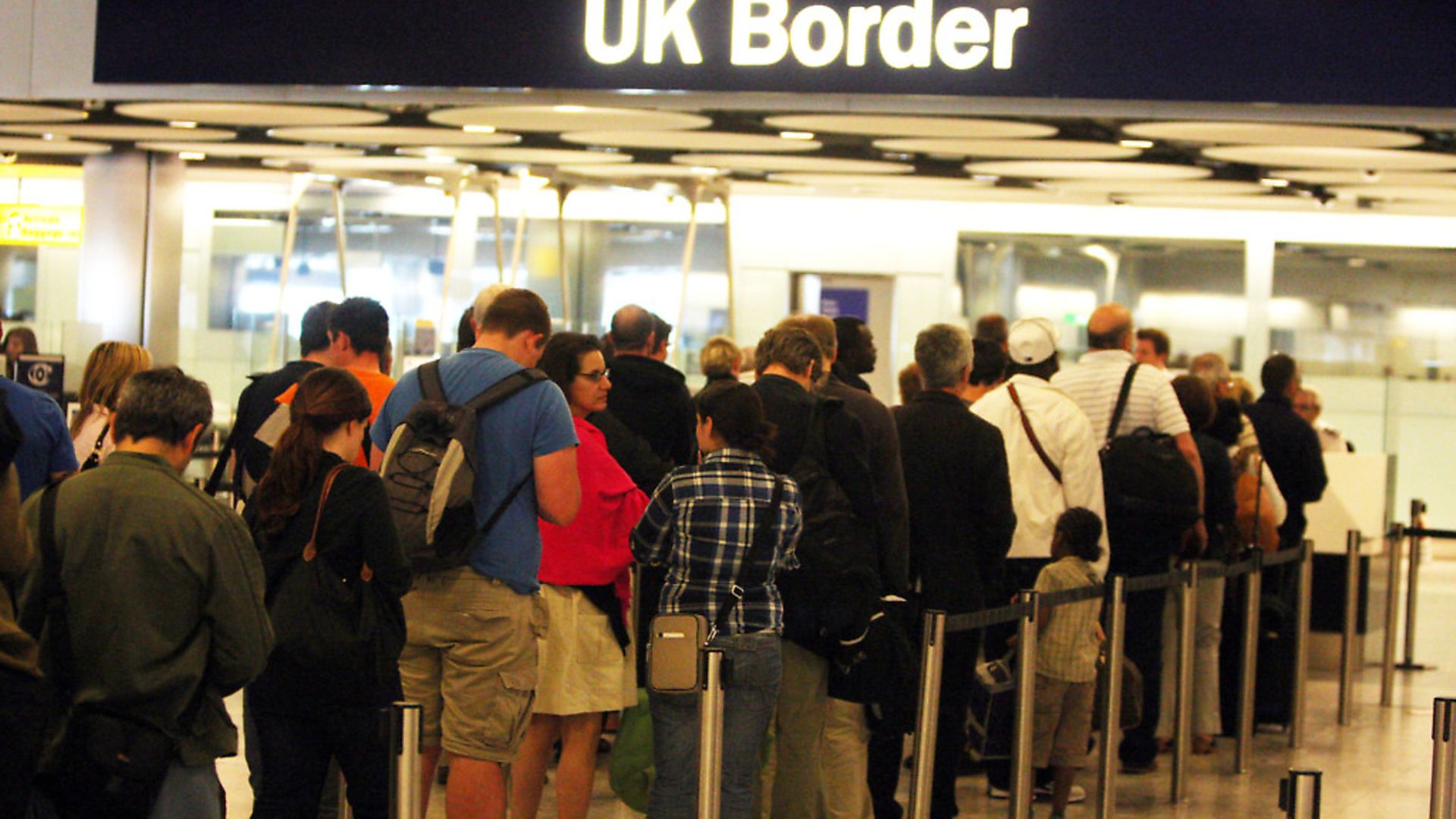
‘We want tighter borders’ cried some in the media only to moan when Brits had to queue at passport control. Here Liz Gerard examines yet more media hypocrisy.
They gather outside the shed and chat in the sunshine, dogs tugging on their leads. The chinos and capri pants are gently pressed, the loafers are unfeasibly clean, sweaters are draped over the shoulder in case the temperature dips below 25C – unlikely at this time of day.
Tanned, with good teeth and good hair that glints with golden (for the women) or silver (for the men) highlights, they are walking advertisements for a particular lifestyle. The expat lifestyle.
For the shed is the arrivals hall at Bergerac airport on the edge of the Dordogne, home to the largest expat population in France. Our group is there to meet friends and relatives popping over for a taste of the idyll.
For years, conversation outside the shed has tended towards ride-on mowers, sprinkler systems, good restaurants and good wines. Now it is more often about Brexit. Or, rather, ‘Bloody Brexit’. They look exactly like the people the Daily Mail imagines its readers to be, but they have very different views on Brexit – on which they had no vote.
There are plenty of conversations about Brexit inside the main airport building, too.
Roumanières is basically an airstrip on a field, handling at most 12 flights a day. But over the past 15 years, it has seen a near-twentyfold increase in passenger numbers – from 16,000 in 2001 to more than 300,000 last year, with a record 51,337 last month. And that growth has been driven by the British.
For on top of the expat community, Brits account for the vast majority of the four million visitors a year who make the Dordogne France’s most popular rural tourist spot. Eleven of the 14 destinations with scheduled flights to the airport are in the UK (the others are Nice, Rotterdam and Charleroi in Brussels) and 76% of the passengers are British.
The airport is expanding to meet the increased demand. The check-in area is bigger and the departures lounge has been upgraded – it now has three ‘gates’ instead of two, a new bar has opened and a duty-free shop is under consideration. Ramshackle car-hire caravans have been replaced by log cabins. The car parks have been revamped (the drop-off zone now has a canopy made up of solar panels) and there are plans for more aircraft parking. The next big step will be to say farewell to the shed when the arrivals hall is refurbished from next year.
Brexit is bound to have an impact on the business – but what sort of an impact? Emily James, head of marketing and route development, says: ‘We will be affected, but cannot begin to comprehend to what extent.’
Her concern for the British expats is in sharp contrast to the Brexiteer ‘send them home as soon as possible’ view of EU nationals in the UK – although Leavers would probably cite the growth of Bergerac as evidence that Europeans need our business more than we need theirs.
‘With a vast majority of expats being OAPs, one can only imagine that they will be affected through loss of pension, healthcare, status,’ says James. ‘The UK ambassador and consulate general came to the Dordogne in June to talk to worried British citizens and gather information. I don’t know what they’ve done with the information, but I am rather encouraged by their attitude and their willingness to look after their ‘flock’.
‘As far as the airport goes, we will be directed by whatever the flock decides to do, as they are our mail passenger profile – whether the expats themselves or their visiting friends and relatives. The only steps we can take are to follow the EU debates closely and submit our views, along with other French regional airports that service the UK.’
James is particularly concerned about possible differentials in taxes and fees between EU and non-EU citizens that could make flying more expensive for the airport’s core clientele.
For the time being, though, there’s a bigger worry; one that gives our expats more time than they would wish to chat about Brexit: terrorism.
Time was, the 737 would land and the visitors would emerge through the sliding doors 10 or 15 minutes later. Passport control was a quick ‘Bonjour, merci’ exchange with the douanier; baggage reclaim (on the other side of a sheet of chipboard) a single conveyor belt, spewing suitcases out of a hole in the side wall.
Ryanair aims for a 25-minute turnaround for its aircraft. By the time the plane took off again, the passengers it had just deposited would be heading for the pool and a sundowner, the customs officers would be on their way home, the car hire franchises handing over the last keys to people with no locals to meet or greet them. Not any more.
Last summer, regulars were surprised to see their plane refuel, reload and take off again while they were still queueing to show their passport.
Then a tent sprung up outside the shed to shelter those queuing from the sun (or, this being the Dordogne, the downpour). Then polite notices appeared – in English and French – saying that tighter immigration checks were being made. Please be understanding. Please be patient.
It wasn’t hard to understand. Think Charlie Hebdo, think Bataclan, think Nice. And now think the Berlin market, Brussels, Westminster and London bridges, Barcelona.
These days it can take an hour or more to go through passport control at little Bergerac. Imagine what it must have been like in Paris on the first weekend of August, the busiest weekend of the year.
Well of course we know. It was hell. In fact, it was hell across Europe. People tweeted their frustrations, airlines protested, and our newspapers told us all about it. The spate of terrorist attacks had prompted the dastardly EU to order enhanced security controls and – surprise, surprise – these took longer than a glance to see if the passenger at the window vaguely resembled the photograph in the passport they were holding.
For the Mail, the delays were evidence of European bureaucracy and incompetence. For the Express, it was the EU taking revenge for Brexit, foolishly victimising British tourists who made ‘an enormous financial contribution to so many resorts’. These are, remember, the papers that have for years been seething about our ‘wide open borders’ that allow ‘thousands’ of illegal immigrants and jihadis alike to ‘sneak’ into our country.
The notion that Brits were being punished because of Brexit was given welly by the fact that the stricter vetting applied to people travelling from outside the Schengen free-movement zone. Hold that thought as we take a look at the Daily Express from Christmas Eve last year.
The lead story was about Nigel Farage describing the Schengen area as a danger to public safety because terrorists could travel unfettered across Europe. He was speaking after Anis Amri killed 12 people at the Berlin Christmas market and then made his escape through three countries before being shot dead by an Italian policeman. Farage’s opinion was endorsed in a leader column headlined ‘Open borders have been a boon for jihadists’.
They may have had a point. Thank goodness Britain is outside the Schengen area, so that people travelling here from Europe have to go through border checks. But when Britons are inconvenienced, robust border checks become ‘ludicrous’.
Here is the Express leader on this month’s queues: ‘As if travelling were not stressful enough, British holidaymakers are now being forced to stand in immigration queues at some European airports for up to four hours … This newspaper has long called for the EU to take a more robust approach towards the security of its external border and to work harder to prevent potential criminals and terrorists making it into the Schengen zone.
‘However the policy that has been adopted here is utterly ludicrous. If EU leaders are concerned about which people are making it on to the continent they should start by addressing the unchecked migrant flows from North Africa and the Middle East, not waste time victimising British tourists.
‘This is a reminder of how infuriating and wrongheaded the EU’s decision-making process can be. What a relief that Brussels will shortly lose its right to set our laws.’
The new checks came into force in April but were not reported in the Express, although its website did cover the story and warn of potential delays. The website – but again not the paper – had also reported in January that Austria, Germany, Denmark, Sweden and Norway had reintroduced border controls even for travellers from within the Schengen zone.
Going back to Bergerac, we can add France to that list. Emily James says that the same customs and security rules apply to all passengers, wherever they come from:
‘We follow strict orders from the Prefecture. These reinforcements are solely related to the past terrorist attacks throughout Europe and the fact that France is in a state of emergency. Since the beginning of the state of emergency, Schengen and non-Schengen passengers undergo the same scrutiny.’
Five Customs officers, employed by the state, work at the airport. Should there be more? The Express and Mail were angered by the failure to increase staffing levels to cope with the stricter checks – but what would they say if our civil service took on extra people to avoid upsetting foreigners at an airport handling only a dozen flights a day? Would they not rail at the idea of officials being paid to stand around doing nothing between flights?
Asked about passengers’ response to the long waits, James was quite positive: ‘They seem to understand the need to reinforce security; people were scared and often felt reassured by the high-level of security.
‘There are, nevertheless, those who complain bitterly. And no amount of reasoning or explanation can do anything to ease their anger.’
Rather like the Express and the Mail.










